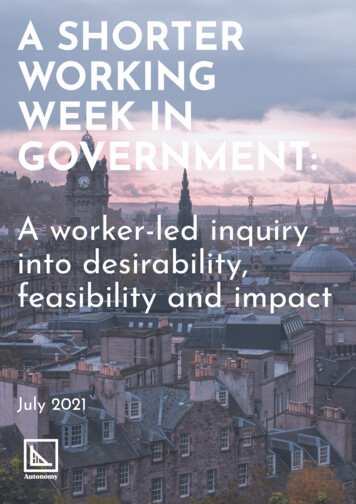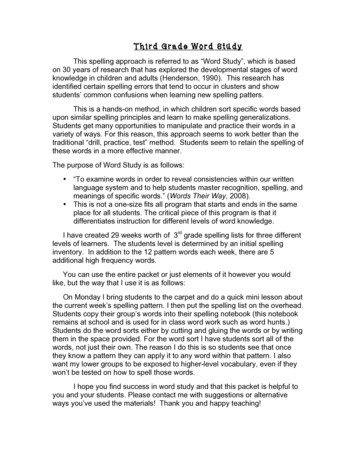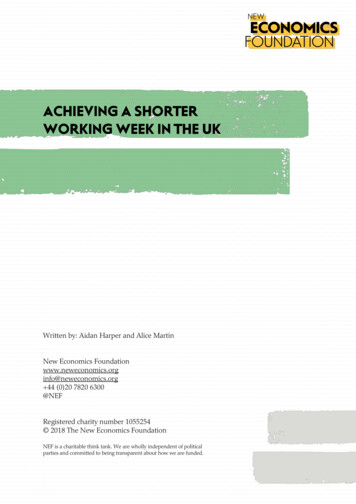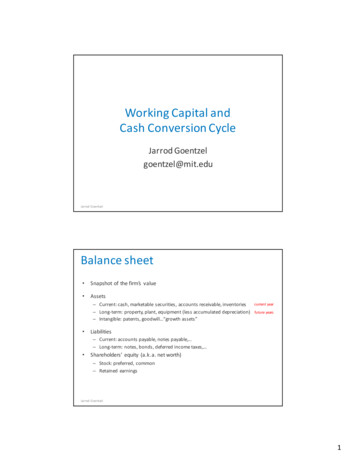
Transcription
A SHORTERWORKINGWEEK INGOVERNMENT:A worker-led inquiryinto desirability,feasibility and impactJuly 2021
AutonomyA Shorter Working Week in GovernmentAuthorsKyle LewisWill StrongeAutonomy is an independent think tank thatprovides necessary analyses, proposals and solutionswith which to confront the changing reality of worktoday. Our aim is to promote real freedom, equalityand human flourishing above all. To find out moreabout our research and work, visit autonomy.workPublished 2021 by AutonomyAutonomy Research LtdCranbournePilcot RoadCrookham VillageHampshireGU51 5RUThis project is supported by the PCS Scotland trade union2
AutonomyA Shorter Working Week in Government1.Executive summary2.Context and ey results7. Conclusions and recommendations8. Appendix 1: full survey results9. Appendix 2: what would the cost of afour-day working week be in the Scottishpublic sector?3
AutonomyA Shorter Working Week in GovernmentI.EXECUTIVESUMMARY4
AutonomyA Shorter Working Week in GovernmentExecutive Summary This is a report on the findings of anintensive consultation process involvingstaff from across the Scottish Government. The consultation process involved workingwith the PCS Scotland trade union, andspeaking to PCS, Prospect and FDA tradeunion members as well as non-unionmembers. The report’s findings suggest thatmany business areas within the ScottishGovernment could move to a shorterworking week without having to employnew staff. The report also reveals that insome roles the move to a shorter workweek will be more complex than othersand would therefore involve new hires. Staff feedback suggests anyimplementation of a shorter workingweek should include the whole ScottishGovernment and be done in such a wayas to not undermine future negotiationsover pay and conditions.5
AutonomyA Shorter Working Week in Government A poll of a sample of over 2000employees from cross ScottishGovernment revealed large support forthe idea. 87% agreed that the employershould pilot a four-day working week fromacross all areas of Scottish Government. All three modes of engagementdemonstrated how valued flexible workingis within the Scottish Government, with84% agreeing that they have sufficientflexibility within their job. A large majority of staff (84%) alsobelieved that they could adapt theirwork processes in order to suit a shorterworking week. The report demonstrates clear, perceivedbenefits for the employer. These include:retention and recruitment of staff;being seen as a pioneer in setting newworking time standards for the Scottisheconomy; and having a happier/ healthierworkforce.6
AutonomyA Shorter Working Week in GovernmentII.CONTEXTANDINTRODUCTION7
AutonomyA Shorter Working Week in GovernmentIntroductionWhat do we mean by a shorterworking week?A shorter working week is a reduction of weeklyhours spent working, with no associated loss in pay.It operates on the principle that people should beable to spend less time doing what they have todo to get by and have more time for other pursuits- be they shared family responsibilities, unpaidvolunteer work, or simply pursuing one’s own desires.In the early and mid-twentieth century, this goalwas advanced by collective bargaining, productivitygrowth and progressive legislation, but as the hoursof workers across the UK continued to rise in recentdecades, we saw the reversal of this goal, with allof the associated negative outcomes of overwork,reduced leisure time and poor mental health.Over the last decade, however, we have witnessedthe re-emergence of reduced working hours as akey policy objective. Its implementation is oftenarticulated as a four-day week (reducing weeklyhours, for example, down from around 37 to 3228), and an increasing number of feasibility studiesand trials highlight that a notable reduction inworking hours provides a range of tangible benefitsfor both employees and employers. For example,staff experience more time for leisure, socialisingand community activities, as well as enhancedmental and physical health. Employers, on the otherhand, see significant increases in productivity, lessabsenteeism and positive outcomes with regards toretaining and recruiting staff.8
AutonomyA Shorter Working Week in GovernmentFrom the German manufacturing sector and theUK postal service to large corporations such asMicrosoft and Unilever, reduced working hours hasreappeared as a key objective for the twenty-firstcentury workplace, called for by unions, employersand political parties alike.A reduction in hours with no loss in pay has beenembraced and forwarded as a key demand for thePCS trade union and its members. Over the lastfew years the PCS Scotland Pay Claim for ScottishGovernment has been for ‘A reduction in theworking week to 4 days, 28 hours with no loss of payor terms and conditions’. In addition, large parts ofthe Scottish Government switching to home workingovernight due to the pandemic has illustrated whatwas once conceived of as ‘radical’ changes to theconditions of work are in fact feasible, if there is acollective willingness to do so.It is against this backdrop that the scoping projectbetween PCS and Autonomy took place. Autonomyengaged with PCS members and non-members toexplore the potential for implementing a four-dayweek across the Scottish Government (SG). Thisinvolved consulting with workers through threemodes of engagement (workshops, interviews andsurveys) in order to capture and evaluate both thepracticalities and potential benefits of implementinga work time reduction initiative across differentdepartments and job roles. We also carried out apoll with a large sample of the workforce, asking fortheir views on the issue.9
AutonomyA Shorter Working Week in GovernmentWhat did the exercise aim to achieve?The expressed intentions behind this scoping exerciseare the following: (A1) To ascertain from SG workers both thedesirability and feasibility of implementing a worktime reduction scheme, defined as a 28-32-hour, orfour-day, week without a reduction in pay. Factorsof desirability include the levels of support (bothquantitatively and qualitatively) for a 28-32-hour4-day week. Factors defined under the remit offeasibility will assess the degree to which differentjob roles/departments across the SG couldsuccessfully enact, and adapt to, a shorter workingweek schedule. (A2) To offer a broad but highly inclusive recordof the potential impact that working less couldhave on SG workers’ lives, both inside and outsideof the workplace. For example, do they feel thatthey would benefit from working shorter hours, withregards to their well-being, mental health, personalautonomy and work-life balance? Do they thinkthat working time reduction would improve thequality of their work? (A3) To inform and empower PCS reps throughtheir participation in the process of helping tocoordinate, organise and participate in workshopsand interviews.10
AutonomyA Shorter Working Week in GovernmentWe aimed to capture the testimony and experience ofmany - but not all - workers in the Scottish Government.Considerable effort was made to conduct workshopsand interviews representing a diverse range of workingexperiences. Thus, we wanted to understand andcapture the ways in which certain factors influencedworkers’ views on the prospect of a shorter workingweek. The factors that are of particular interest includethe following: job role, work setting, disability, full orpart-time working and caring responsibilities.We worked closely with senior PCS staff and reps inboth the design and implementation of the project (A3).For example, regular feedback was sought from PCSin making sure our methodological approach was inconsonance with both the aims of the project and thecontext we would be working within, e.g. the constraintsor limitations we would face in being able to obtain thetestimonies and experiences set out above. In addition,PCS reps were actively encouraged to attend and guidediscussion within the workshops.11
AutonomyA Shorter Working Week in GovernmentI.METHODS12
AutonomyA Shorter Working Week in GovernmentMethodsWe implemented a mixed method approach utilisingthe modes of engagement outlined above (workshops,interviews and surveys). Our methodological approachis based on capturing detailed qualitative data in away that can inform any further initiatives on workingtime. In this way, the scoping exercise performed canbe viewed as a useful tool for getting a handle on thefeasibility of working time reduction, in lieu of an actualpilot scheme or full implementation.The surveys utilise ‘closed’ questions (questions thatrequire the selection of clearly defined, preparedanswers) to gather quantitative assessments of workersentiment about the notion of working time reductionand surrounding issues. This allows us to infer certainconclusions from staff responses and perceive generaltendencies that can be further explored via group(workshops) and individual (interview) qualitativesettings.One on one interviews were semi-structured in design.This channel of engagement dovetails with the staffsurveys, insofar as they provide the nuanced andsubjective ‘open space’ to expand upon the narrowlydefined questions found in the survey. The surveys andinterviews therefore represent the main channels forevaluating individual staff knowledge and experience.13
AutonomyA Shorter Working Week in GovernmentThe workshops provide the opportunity to engagewith a wide sample of workers from the multipledepartments and delivery bodies that make up theScottish Government. It also provides an opportunity todiscuss, debate and collect feedback constructed in acollective rather than individual setting. These sessionswill capture collective data in relation to the aims of theproject set out above (A1 A2).14
AutonomyA Shorter Working Week in GovernmentIV.INTERVIEWS15
AutonomyA Shorter Working Week in GovernmentInterviewsSummary findings There is a high degree of collective supportand buy-in for a shorter working week withinthe SG Its perceived desirability related to staff havingmore time to carry out caring responsibilities,activities associated with personal developmentand hobbies No major concerns were expressed by staffregarding the Scottish Government exploringthe introduction of a shorter working week Staffing numbers, access to sufficienttechnological resources, management buyin and reducing/making meetings moreproductive, were identified as essentialrequirements for enabling the successfulimplementation of a shorter working week The interviews identified flexible working asbeing a highly valued condition of employmentwithin the Scottish Government Testimonies captured from the interviewssuggest that any shorter working weekscheme needs to engage with and expand theconcept of flexible working within the ScottishGovernment16
AutonomyA Shorter Working Week in GovernmentContext and Covid workingThe one-on-one interviews were semi-structured indesign. This provided the space in which to capturepersonal testimonies on both the desirability andfeasibility of implementing a shorter working weekin their place of work. In addition, the intervieweesreflected attempts made to provide a representativesample of both the diversity of jobs roles and livedexperiences that make up the Scottish Government.Interviews were conducted over a three-week periodwith thirty two separate interviews being carried outin total.It is important to note that the interviews took placeagainst the backdrop of SG workers having been, inthe main, working from home for an unprecedentedperiod of time due to the Covid-19 pandemic. Wetherefore wanted to understand how home workinghad impacted issues relating to working time andhow these changes influenced workers’ comparisonsof working life pre-and-post pandemic.Before commencing the interviews, particularattention was given to contextualising what wasmeant by a shorter or a four-day week in orderto avoid any ambiguity or misinterpretations.Among the workers we interviewed however,existing awareness of the shorter working weekas a policy objective was strong with the majorityof workers commenting that they had read aboutcompanies, whether in the UK or abroad, adoptingsuch an approach in order to increase productivityor the overall health of workers. This provided amoderately well-informed background in whichquestions of aspiration were answered.17
AutonomyA Shorter Working Week in GovernmentThe questions asked related to the followingcategories:Aspirations - in what ways would a shorterworking week improve or impact on their livesApprehensions - what are the main worriesor concerns about the Scottish Governmentimplementing a shorter working week in eithertheir individual work setting or across theScottish Government more broadlyIdeal modes of implementation - forexample, For full-time staff, would they prefershorter hours across five days or a four-dayweek with a universal day off? For part-timeworkers, would they prefer a pro-rata reductionin hours or an uplift in pay?Flexibility & home working - How, and inwhat ways, does the shorter working weekconnect with desires and aspirations to workdifferently post-pandemic?Overcoming obstacles - suggestions andrecommendations for overcoming potentialimpediments for implementation18
AutonomyA Shorter Working Week in GovernmentAspirationsThe overwhelming tendency that emerged fromthe interviews concerned how a shorter workingweek would provide greater autonomy to pursueactivities of personal or social responsibility (i.e.care or voluntary work), or to take more time forpersonal development or hobbies. In addition,workers also were able to comment and speak fromnot only a personal perspective but from what theyperceived to be the benefits for the overall teamor organisation. Many people commented on theirteams consisting of either a high proportion of parttime workers or staff with caring responsibilities whowould benefit from having extra time to managedomestic workloads. The quotes below are a samplethat reflect these tendencies:Benefits for part-time staff“We have a lot of part time staff and parents whowork part-time so that they pay less for childcare,etc. So from that point of view, a shorter workingweek would be absolutely fantastic for thembecause their pay would go up. From an agencypoint of view, from a staff point of view, it would begreat”.Making time for personal development“I think I would do something for personaldevelopment. Learn a new language, or a newsubject.”19
AutonomyA Shorter Working Week in Government“I think a four-day week would benefit me in lots ofways. Pre-Covid, there were things that I regularlydo that I found myself missing because I felt thepressure of, you know, doing an extra half hour (ofwork), so I felt like I was constantly missing out.And there’s training outside of work which I do forpersonal development. It would give me more timeto focus on that rather than waiting till the eveningwhere I’m absolutely knackered. And the final thingis my mother., My mother is quite elderly and herhealth is starting to fail. And that’s something that,you know, regardless of whether it was a four-dayweek, is something I need to consider in terms of fulltime working”.“Yeah, I have come across the idea [of the four-dayweek]. I really, really like the concept. I feel like alot of the time I don’t have time for my hobbies, likevolunteering. I started volunteering at a communityfarm but realised pretty quickly that I would havebeen working every single Saturday, meaning Iwould only have one day off a week. If that daywas freed up, I’d certainly like to get back intovolunteering again”.“I come from a position where I can see a realadvantage of reducing the working week to fourdays. So I think some of the discussions aroundproductivity have shifted, certainly in the last fiveyears or so anyway, in that there is a much moreholistic view that workers’ well-being is part ofthat picture as well. So I see the four-day workingweek as a transition progression, a natural step torecognise that productivity can be measured in lotsof different ways and someone’s health and wellbeing is really important”.20
AutonomyA Shorter Working Week in GovernmentGame changer“It would [make] a massive difference. Even justpicking [the kids] up from schools a couple of daysa week, would be really good. It would be a bit of agame-changer I think.”ApprehensionsOur second set of questions wanted to capturewhether there were any overarching concerns orproblems that people had regarding the ScottishGovernment pursuing a shorter working weekinitiative. Whilst none of the interviewees had anymajor concerns (i.e. issues that were viewed as beingeither insurmountable or having a detrimentalimpact on working life), some common themes didemerge.The first concerned how a shorter working weekwould impact the amount of contact time peoplehad with the whole team and difficulties it mightcreate in either managing a team or keeping on topof workloads in a reduced timeframe; the secondquestioned whether there would be the resourcesin place to recruit the extra staff where that wasneeded; and the last centred on how a shorterworking week would function for workers who wereeither public facing (i.e. the service they provideneeds to be available 5/7 days a week), or workingnon-standard shift patterns. The quotes below are asample that reflect these tendencies:21
AutonomyA Shorter Working Week in GovernmentProblems with shift work“It’s going to prove quite interesting trying toimplement it within Food Standards Scotland,because we are all paid by the meat industry.Any extra cost would have to be either met out ofScottish Government funds or through some kind ofgrant. Or, alternatively, the meat industry will haveto pay for it, so it might be slightly problematic fromthat perspective. However, it would also bring morepeople into the business as well. We need extra meatinspectors, because the meat plants will operate onthose days that we are not working.“It would mean more job creation, so it would be aselling point as well, probably”“I personally don’t think four-days would work. Ican’t see how a fishery office could work on a fourday rota unless we had the money to invest in morestaff to allow more teams so that way the shifts arealways covered. I could see five days with less hours,but again you would still need the staff and extraresources in place”.Lack of contact time“My concern would be that If you’re trying tomanage a team, and you’re off one day andsomeone on your team is off another day, thenyou’re only in contact for three days at the sametime per week, which I think could cause problems”.22
AutonomyA Shorter Working Week in GovernmentWork intensification“I would be slightly worried that there would be anexpectation that productivity is going to increaseand that would necessarily be an organic process.From me, as a member of staff, I would worry thatthere would be a sense of you’re only working fourdays but you need to do extra work”.Ideal modes of implementationThe next set of questions wanted to gauge workers’opinions on how a shorter working week would bebest implemented. These questions took into accountperspectives from both part and full-time perspectives.From a full-time point of view, there was anoverwhelming preference for a four-day week, ratherthan five shorter working days. The justification for thiswas based on a perception that people would likelyend up working over their new hours on each day,defeating the purpose of the change. In addition, twoworkers who were coming up to retirement commentedon how a four-day week without a loss in pay would bea significant factor in delaying retirement.In terms of part-time workers, no clear consensus wasfound regarding an ideal mode of implementation,with a near fifty fifty split in interviewees favouringeither a raise in salary or a pro-rata reduction inhours that was in line with their full-time colleagues.However, nearly everyone interviewed emphasisedthe importance of making sure any implementationwas malleable enough to allow for greater flexibilityand personal choice (see flexibility and home workingsection below for an expansion on these themes).The quotes below are a sample that reflect thesetendencies:23
AutonomyA Shorter Working Week in GovernmentThe benefits of a four-day week“So personally, I think it would be easier for peopleto take time off by just cutting off Fridays, so justremove Fridays from the working week. Becausewhat happens is you get sucked into working. I’ll sayto my partner, I’ll be finished by half five today orI’ll be finished by 6:30 and I’m still sitting there at7. And it’s because I enjoy what I do and I’m in myflow. Giving people a universal day off like Fridaywould recognise and reward people for the aboveand beyond culture people work within the SG,whilst hopefully preventing people burning out atthe same time”“I think, based on past experience, I would definitelyprefer to work less days rather than shorter days. Ihave done both and when I was part time I wasn’tdisciplined enough doing shorter days and would,more often than not, just end up working till 5 or6. So that would be my concern if I was workingfive short days - I don’t think I would get any of theperceived benefits”.Delaying retirement“The few guys that have talked about this think it’san absolutely brilliant idea [the shorter workingweek proposal] because we’re quite an ageingworkforce. Recently there’s been a few younger guys,but on the whole a lot of guys are 59 or 60 andwe’re looking at either retirement or reducing ourhours. So a four-day week, or the chance to reducefurther, could definitely help in prolonging mycareer as such, because it is a fairly demanding rolephysically. So lots of lots of people are quite keen ontrying to do this (reduce hours) so a shorter workingweek could help with turnover and retention”.24
AutonomyA Shorter Working Week in GovernmentGiving part-time workers the choice“So I think it’d be good to have an option whereyou could say that I would like a few less hours. I dotwenty hours a week at the moment and having theoption to do say four less would be very appealing,due to my mental health issues. I would feel moreon top of things and there would be less chance ofme getting ill and having to take time off work dueto the stress work has on my condition. So havingthe flexibility to work less as a part-time member ofstaff would be really beneficial to me”.Flexibility and home workingQuestions on flexibility and home working weredesigned to gauge how people experienced workinglife during the pandemic and, in turn, how theseexperiences correspond with implementing a shorterworking week. When asked about the benefits ofhome working during the pandemic, the majorityof workers commented on how this form of workinghad a positive impact on productivity and beingable to spend more time helping out with caringresponsibilities. This was due to the significantamount of time saved by either not having tocommute/travel to meetings, or due to being ableto work at a time that was more amenable to them(for example, having the flexibility to completecontracted hours in a way that home workingaffords over a fixed setting).Some of the workers interviewed felt that if homeworking was to continue in some form for theforeseeable future that the productivity gains andthe costs saved by the SG (for example, not havingto rent large office spaces) should be passed backto the workforce in the form of shorter workinghours.25
AutonomyA Shorter Working Week in GovernmentIn addition, there was an overwhelming consensusthat the flexi-system currently in place and used bythe majority of SG workers interviewed, is both ahighly valued condition of work and an importanttool for implementing a shorter working weekscheme. This is due to the flexible working culturealready in place in the SG, whereby people feel ableto bank and reclaim the extra hours they work inthe form of annual leave. Thus, many intervieweesfelt the flexi-system already in place (combinedwith many people in the SG working part-time)had created the conditions in which people couldsuccessfully adapt to the implementation of ashorter working week. It must be stated, however,not everyone interviewed had access to the flexisystem and that people were conscious of the needfor extra staff numbers if the working week was tobe reduced. The quotes below are a sample thatreflect these tendencies:Improving work-life balance“It took a bit of getting used to working from home,I must admit, but I actually like it now. I find myFlexi isn’t under nearly as much pressure of beingover the limit that it was because if I was in theoffice, the temptation was to take half an hour atlunchtime and just push on. Now, being at home, Itend to take an hour for my lunch and by about halfpast five quarter six, I’m thinking I’ve had enoughand shutting the computer down. So it’s probablyhelped my work life balance working from home”.26
AutonomyA Shorter Working Week in GovernmentSharing caring responsibilities“Home working has enabled me to nip out and helpwith childcare, which is something that I wouldn’treally have done previously in my role. My wifewould have done most of the childcare, but sheworks as well. So it’s been very easy to say, “I’llcollect them from school or drop them off in themorning” and that kind of thing. These are things Iwould almost never have been able to have accessto previously”.Benefiting from increased productivity“We’re saving so much time not having to travelfor meetings. Using video calls is something weshould have utilised years ago if I’m being honest,because it really has been incredibly useful not onlyin terms of productivity and cost saving, but also interms of inclusivity - having a video call is way moreaccessible for people with disabilities or who havecaring responsibilities. It would be great to get awee bit of that time back by working shorter hours,for sure”.“Meeting attendance has gone up, that’s myexperience anyway. I used to go to meetings inMotherwell, meetings in Glasgow, and, you know,we’d literally get up, drive an hour and a half toGlasgow, be in a meeting for an hour and then drivean hour and a half back and your day is pretty muchdone. There would always be people that didn’t makeit because it had something else. But now, meetingattendance has shot up because everybody canpretty much be at everything. So again, we are waymore productive as a team and I feel we need tothink about how this productivity gain can, movingforward, be given back to us in some way. So workingshorter hours could definitely be an option”.27
AutonomyA Shorter Working Week in GovernmentUtilising the flexi-system“The flexi system is great and something I reallyvalue. I think it would enable a smooth transitionto a four-day week, as the system allows people tobuild up time and take it off when it suits them. Itwould just require that we had the resources in placeto be able to pay for extra staff and to make surepeople didn’t all take the same day off and leaveus short staffed on certain days. But, like I say, wealready have those processes in place”.Overcoming obstaclesThe last set of questions attempted to capture theways in which potential barriers to implementinga shorter working week could be overcome. Threecommon themes emerged: the need to invest in notonly more staff, but also labour saving technology;to put processes in place to reduce the amount ofmeetings scheduled within the working day; theneed for management to embrace and promote ashorter working week culture.With regards to technology, many intervieweescommented on how a lot of their working time istaken up by tasks that are labour intensive andcould be reduced if they had greater access tomore up-to-date technology - either in the form ofautomating or project management software. Thesesentiments were also repeatedly expressed in theworkshops as well.The amount and length of meetings was also seenas a potential barrier to implementing a shorterworking week. A number of workers expressed theneed to put processes in place that either reducethe number of meetings scheduled throughout theday, or the amount of time it lasts.28
AutonomyA Shorter Working Week in GovernmentAnd finally, in order for a shorter working week tobe successful, a number of interviewees commentedon the important role senior management wouldneed to play in making it a success. Suggestionsincluded management setting an example by:embracing and promoting its benefits; reducingpart-time stigma; and allowing staff the flexibility inwhere they choose to work from (i.e. from home orin the office). The quotes below are a sample thatreflect these tendencies:Utilising technology“We will need to change the way we work. I think thepandemic has shown how when you’re forced intousing new technology it can be incredibly usefuland efficient. Let’s look at all the incredibly dull andlabour intensive work we do and see if we can usetechnology in a way that helps us to reduce hoursand allows us to do the parts of our job we enjoydoing the most”.“I come from an innovation background so oneof the biggest frustrations I find in working forthe Scottish Government is an inability to utilisetechnology and to embrace new ways of doingthings. It’s something I’ve argued for years, I’m likewhy are we still using a system like this? Why can’tit be automated? There are systems that we coulduse and adapt that would save us so much timeand money. So if we are to work less hours we needa complete change in approach in how we utilisetechnology”.29
AutonomyA Shorter Working Week in GovernmentA change in working culture“Not that long ago I had twelve meetings scheduledin a day. I literally had back to back mee
time reduction scheme, defined as a 28-32-hour, or four-day, week without a reduction in pay. Factors of desirability include the levels of support (both quantitatively and qualitatively) for a 28-32-hour 4-day week. Factors defined under the remit of feasibility will assess the degree to which different job roles/departments across the SG could










